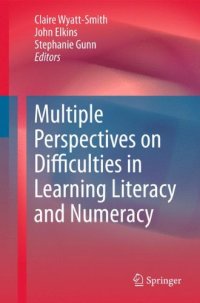
Ebook: Multiple Perspectives on Difficulties in Learning Literacy and Numeracy
- Genre: Education
- Tags: Mathematics Education
- Year: 2011
- Publisher: Springer Netherlands
- Edition: 1
- Language: English
- pdf
This book advances understandings of the difficulties in learning that students experience in the key areas of literacy and numeracy and the interventions that have been used to improve outcomes. By including authors drawn from several countries and with expertise in a variety of research traditions, the book addresses the sometimes complementary and sometimes contradictory results, and generates new approaches to understanding and serving students with difficulties in literacy and numeracy. A distinctive feature of the book is its focus at the intersection of literacy education, numeracy education and learning difficulties. Traditionally these have tended to be addressed separately by researchers and policy makers, leading to compartmentalised thinking and often demonstrates lack of awareness of developments in the other domains. In short, to date there has been limited exchange across these fields. Further, the published research and indeed policy attention indicates a relative imbalance given to literacy and numeracy education and learning difficulties relative to these more generally. The authors in this book respond to this by providing a more balanced coverage of these fields and extend the discussion into the contribution of information and communication technologies. This book brings together for the first time internationally recognised scholars from a diverse range of countries whose contributions provide an opening for new insights into difficulties in learning literacy and numeracy from a range of educational policy and practice contexts.
There are many approaches to researching the difficulties in learning that students experience in the key areas of literacy and numeracy. This book seeks to advance understanding of these difficulties and the interventions that have been used to improve outcomes. The book addresses the sometimes complementary and sometimes contradictory results, and generates new approaches to understanding and serving students with difficulties in literacy and numeracy. The book represents a departure from conventional wisdom as most scholars and graduate students draw upon ideas from only one of the three domains focal in the book and usually from one single or dominant theoretical frame. Typically, readers will affiliate with reading education, mathematics education, or learning disabilities and belong to one of the corresponding professional associations such as IRA, NCTM, or CLD. This book’s scope will open a scholarly forum for engaging readers with a familiarity with one of these domains while providing insight into the others on offer in the book.